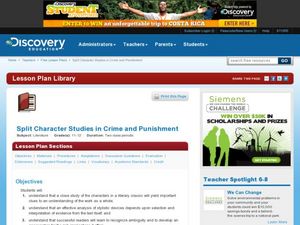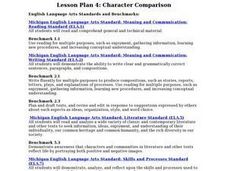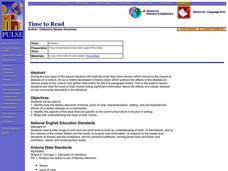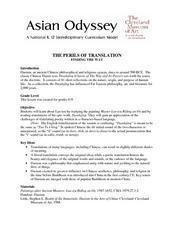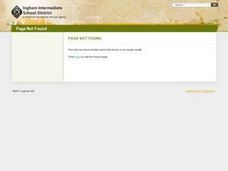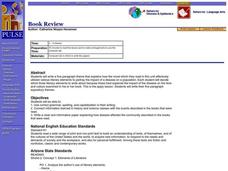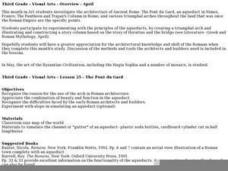Curated OER
Discussion: The Arts
In this discussion about the arts worksheet, young scholars ask and answer questions concerning the arts and support of the arts.
Curated OER
Split Character Studies in Crime and Punishment
Students identify characters who exhibit conflicting character traits. In this Crime and Punishment instructional activity, students identify and discuss characters who have opposing character traits. Students relate their...
Curated OER
Forging Freedom
Students read the story Forging Freedom by Hudson Talbott about the holocaust. In this holocaust lesson plan, students also answer discussion questions.
Curated OER
The Freddy the Pig Series
Students read the series of books called The Freddy the Pig Series by Walter R. Brooks and complete activities with them. In this The Freddy the Pig Series lesson plan, students write poetry, create drama, write in journals, do...
Curated OER
Edinburgh Festival Lessons That Teach About Culture And Art
The Edinburgh Festival provides a way for students to explore lesson plans about opera, theater, and music.
Curated OER
Historical Puppet Play
Fourth graders analyze the book Train to Midnight, based on the Underground Railroad. They compose and perform a puppet play based on the book. Students perform and videotape their puppet plays.
Curated OER
Sequencing a Chinese Folktale
Students sequence the events of the popular Chinese folktale "The Terrible Nung Gwama" using a graphic organizer. This lesson takes 45-minutes and includes two possible enrichment activities.
Curated OER
"Encounter with a Skull" by Koda Rohan
Students, in pairs, develop two poems--one must be a haiku, the other must be a tanka. They recite their poems to the class.
Curated OER
Character Comparison: Tales of a Fourth Grade Nothing
Fourth graders compare and contrast Fudge and Peter, two main characters from "Tales of a Fourth Grade Nothing". They use a software template to analyze and compare the characters in a rough draft, edit their work and then produce a...
Curated OER
Time to Read
Students identify how the literary elements of theme, point of view, characterization, setting, and plot illustrate the effects of a certain disease on a community. They identify the aspects of the book that are specific to the...
Curated OER
Music Drama & Richard Wagner: The Lord Of The Ring
Students study Richard Wagner and his idea of "Music Drama". Students listen to his music, pantomime, and lead "music dramas" to discover Wagner's idea of the world of composition and drama.
Curated OER
The Perils of Translation
Young scholars discover the challenges of translating poetry written in a character-based language through the study of Lao-tzu's work, Daodejing. This instructional activity includes possible extensions and evaluations.
Curated OER
Poetry
Fourth graders participate in reading and listening to poetry. They are exposed to a variety of poems and examine and identify basic elements of poetry. They write their own poems and recite a poem with enthusiasm, expression, and props.
Curated OER
Childhood Through the Looking-Glass
Students learn about Lewis Carroll and the vision of childhood he created in Alice in Wonderland, then compare Carroll's Victorian world of childhood with the world of "Innocence and Experience" portrayed by the Romantic poet William Blake.
Curated OER
Picasso; Comparing Blue and Rose Periods
Third graders research Picasso's art career. They use a word processor to create a Venn diagram which compares Picasso's Blue and Rose Periods.
Curated OER
Grab Hands and Run: Understanding Human Rights
Sixth graders read the novel Grab Hands and Run by Frances Temple. They explore the effects of war on human rights. Students explore the idea that human rights are protected by the United Nations. They identify the human rights that were...
Curated OER
Book Review
Students write a five paragraph theme that explains how the novel which they read in this unit effectively utilized various literary elements to portray the impact of a disease on a population. They then decide which three literary...
Curated OER
Editing Emily's Way: An Exercise in Diction and Its Implications
Students examine the poetry of Emily Dickinson and the diction in her poetry. In this poetry analysis lesson, students read Dickinson poetry and analyze the diction in the poems. Students journal about the poetry and rewrite their own...
Curated OER
Harry Potter: Upper Grades Activity
High schoolers interpret symbols and metaphors from Harry Potter that refer to real-life political and social issues.
Curated OER
A Picture's Worth 500-700 Words
Students write a narrative or short story of 500-700 words based on an assigned work of art.
Curated OER
Visual Arts - Overview - April
Third graders investigate the architecture of Ancient Rome, The Pont du Gard, an aqueduct in Nimes, France; The Pantheon and Trajan's Column in Rome; and various triumphal arches throughout the land that was once the Roman Empire are the...
Curated OER
Heeeeeere's Pea O'Vee!
Fourth graders assume the roles of characters in familiar fairy tales and participate in a panel discussion using a talk show format.
Curated OER
"Encounter with a Skull"
Students read a story twice. The first time they read it is without contextual information. They read it with the contextual information.
Other popular searches
- Film and Classic Literature
- Western Classic Literature
- Classic Literature Definition
- Classic Literature Defintion



